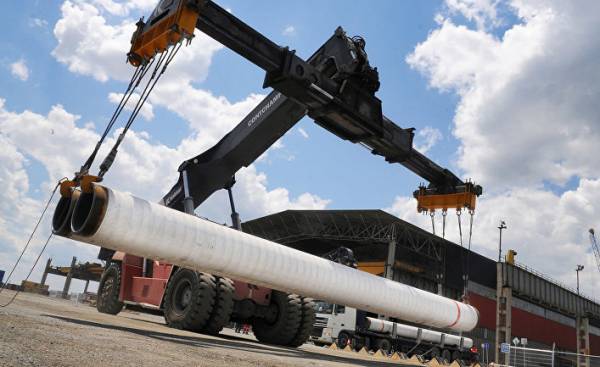
Russian gas giant Gazprom is accelerating the construction of the pipeline “Turkish stream” because of concerns that extraterritorial sanctions proposed by the U.S. Senate ultimately will close this project.
In the Russian business newspaper “Vedomosti” on Tuesday, it was reported that Gazprom Swiss contractor Allseas had already made about 15 miles of pipeline under the Black sea. The coordinates of Maritime transport in the deep division of the Swiss Allseas Audacia show that its vessels are in place and ahead of schedule.
The laying of the pipeline Gazprom is a somewhat risky venture, because until now there was no agreement with the Turks on entering and internal infrastructure of the pipeline. However, this first mile outside of Russia, to the South of the Crimea Peninsula. It takes a long time before they get to Turkey.
The pipeline “Turkish stream” was created as an alternative “South stream” gas pipeline between Gazprom and southern European companies such as Italian Eni, with the aim to create another Russian pipeline to Europe, bypassing Ukraine.
Europeans have canceled the construction of this line, when were the sanctions related to the Ukraine in 2014. Ironically, the same state authorities did not cancel the second line of Gazprom under the name “Nord stream — 2”, which the Russians plan to build in the Baltic sea and rely on funding from the German Wintershall and Austria’s OMV. Both governments criticized the U.S. Senate for blocking the “Nord stream — 2” in my latest bill upgrading penalties. “Turkish stream” in the bill was not mentioned.
In July, Gazprom warned investors that two of the pipeline project could be “delayed or blocked” if the Senate bill becomes law.
The bill was challenged oil lobbyists of the United States, though Republican leaders say that the bill is not passed in Congress for technical reasons.
The bill provides for the expansion and introduction of extraterritorial sanctions, which means that energy companies and companies that supply Russian companies parts, can be squeezed out of this business.
Moreover, the Senate appealed to the State Department and the Director of national intelligence (both clearly anti-Russian), to find out, is it possible that the American investment funds that buy Russian bonds and shares of sanctioned companies, such as Gazprom, indirectly funded government officials subject to sanctions.
Russian oil and gas industry, along with some banks, have been included in the list of sanctions over Russia’s involvement in the separatist movement in Eastern Ukraine.
This week the separatist leaders in the Donbass, one of the regions supported by Russia in the struggle for autonomy against Kiev, said they wanted to create a new Autonomous Republic under the name of little Russia. This step is unlikely to be approved by the Ukrainian government.
Cancel Russian sanctions depends on whether the country refuse from supporting the separatists in the Donbas, and the separatists in other regions, such as Lugansk. And the Ukrainian government should allow the elections there, the result of which will clearly be in favor of autonomy.
Crimea was once an Autonomous Republic within Ukraine. After the collapse of the Pro-Russian leader in Kiev, the Crimea, quickly organized a vote for secession. The vote ended in complete victory. Then Russia annexed the Peninsula in 48 hours, which the UN declared illegal by the act. In the Crimea is Russia’s only warm-water military port.
The return of Crimea to Ukraine is not part of the agreement on the lifting of sanctions. Recently the WSJ reported that the U.S. energy companies do not approve full-scale sanctions against Russia.







